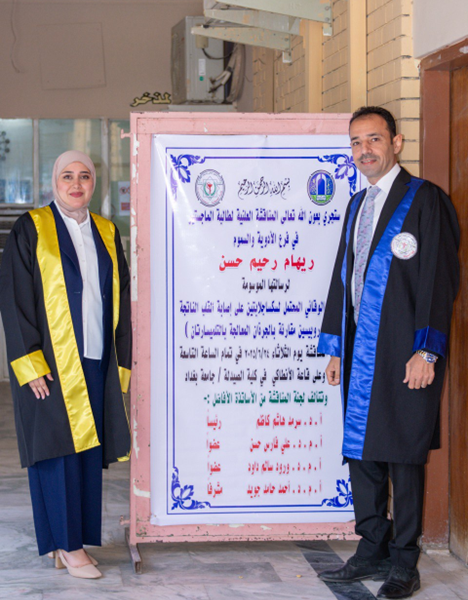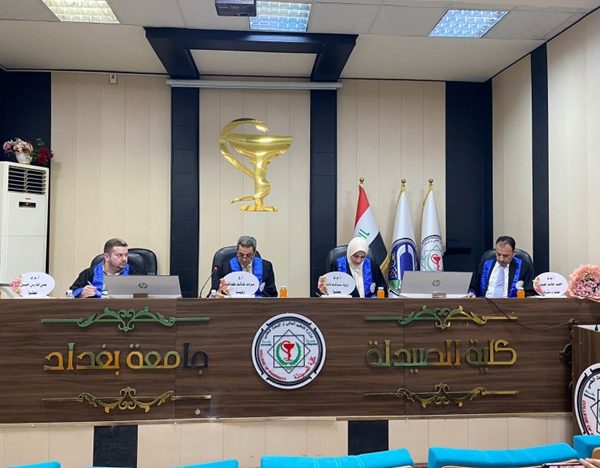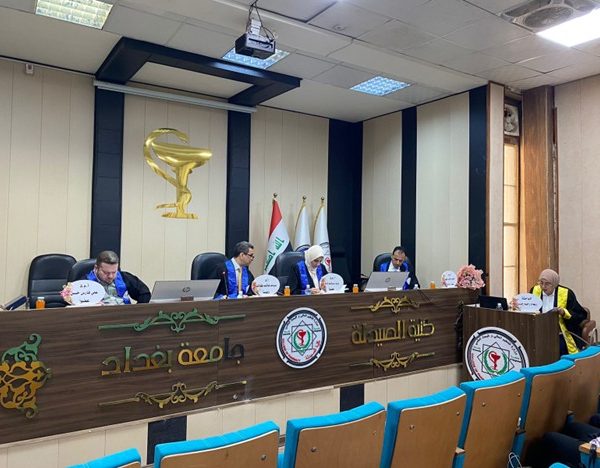The College of Pharmacy discussed the MSc thesis entitled “Evaluation of the Cardioprotective Effects of Saxagliptin and Telmisartan Against Doxorubicin-Induced Cardiac Injury in Rats” by the student Reham Raheem Hasan and the supervisor, Assistant Professor Dr. Ahmed Hamed Jwaid, at the Pharmacology and Toxicology Department.
The study aimed to investigate the protective effects of Saxagliptin and Telmisartan after cardiotoxicity induction by Doxorubicin.
The study included twenty-eight male and female rats that were allocated into four groups of seven and treated as follows: Group I rats received distilled water orally for 14 consecutive days, Group II rats received distilled water orally for 14 consecutive days, and a single intraperitoneal injection of 20 mg/kg Doxorubicin on the 15th day of the experiment, Group III rats received 10 mg/kg Saxagliptin orally for 14 consecutive days, and a single intraperitoneal injection of 20 mg/kg Doxorubicin on the 15th day of the experiment, Group IV rats received 10 mg/kg Telmisartan orally for 14 consecutive days, and a single intraperitoneal injection of 20 mg/kg Doxorubicin on the 15th day of the experiment. After 24 hours from final administration, the experimental rats were euthanized, after which blood and heart tissue samples were obtained for subsequent analyses.
The results showed that there was an improvement in the cardiac tissue of the Saxagliptin-treated group, and even a better one in that of the telmisartan-treated group compared to that of the Doxorubicin group. Moreover, rats that were pretreated with Saxagliptin or Telmisartan exhibited a reduction in the levels of cardiac troponin I (cTnI), creatine kinase-MB (CK-MB) and lactate dehydrogenase (LDH) in the serum compared to the Doxorubicin group. In addition, pretreatment with Saxagliptin or Telmisartan mitigated Doxorubicin-induced oxidative stress by upregulating the gene expression of nuclear factor erythroid 2-related factor 2 (Nrf2), with consequent increase in glutathione (GSH) and decrease in malondialdehyde (MDA) levels in cardiac tissues. Also, pretreating rats with either drugs hindered Doxorubicin-mediated inflammation and apoptosis, as it was evidenced by a reduction in the levels of the proinflammatory cytokines tumor necrosis factor-alpha (Tnf-α) and interleukin-6 (IL-6), as well as a reduction in the level of caspase-3 in the serum in comparison to the Doxorubicin group.
The study recommended that further researches should be conducted utilizing other doses of Saxagliptin and Telmisartan to protect against Doxorubicin-Induced Cardiac Injury. Also, to assess the protective effects of both drugs on other tissues, including the liver and the brain.





